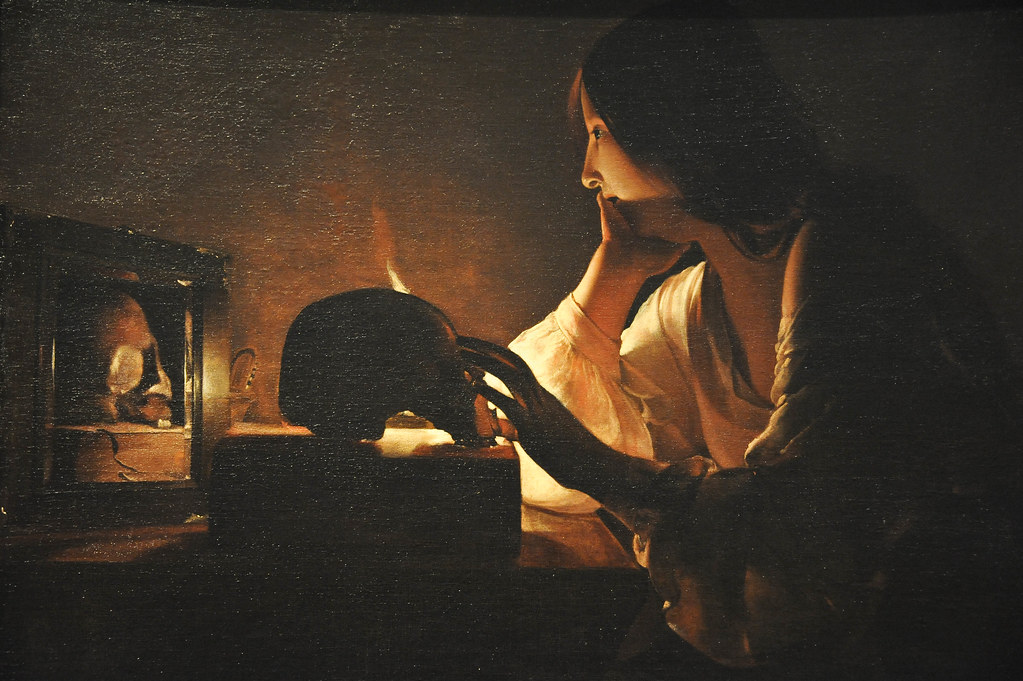
This print is hanging on the wall to the right of my desk. It may seem a little macabre at first glance, but to me it is a reminder to memento mori (remember I will die) and to memento vivere (remember to live).
There are many variations of this painting that Georges de la Tours did from the 1600s. In the painting above, Mary is touching the skull and the skull hides most of the candle. There is a small mirror that only reflects the skull and part of the book that it sits on. In other variations, the flame is on the other side and the viewer can see it clearly. In some versions, the flame is what is being reflected. In others, there is no mirror and the skull rests upon a large open book or two books that are resting on top of a cross that is lying on the desk.
In all of these variations, it is interpreted that the flame represents the spark of the divine, the skull represents the reminder of death – perhaps of both Jesus and of her brother Lazarus – and the mirror represents self reflection. Mary, who is believed to have led a sinful life before meeting Jesus, is penitent, and therefore looking rather morose. There are, of course, numerous interpretations of what de la Tours could have been trying to convey in this painting, but let’s see ourselves in it.
I have this print hanging on my wall because it represents so much more than just Mary Magdalene. Sure, doing an analysis based on her life according to the scriptures would be rather interesting, but I would rather consider what it says to me and what I see rather than how I think Mary is feeling or how Georges is representing her here.
In one sense, I see the family caregiver in this painting. The loved one has died and due to difficult family dynamics, there is complex grief which exacerbates the already present conflict. She is at peace with the death itself, but is reflecting on what it means to her, who she is in the midst of it all, and what the next right step looks like.
The flame glows with her own enlightenment throughout the loved one’s dying process. The intransigence of her siblings or other family members has left her distraught and yet, at the same time, there is a peace that she finds as she reflects on the fragility of life. She is remembering in this moment that we all must die, but that we also have the agency to harness our benisons and live life as we will – hopefully to its fullest.
This image of the family caregiver gives me passion about what I do. Bringing some semblance of hope to the family in the midst of their grief and loss that doesn’t just begin when the loved one dies, but long before. Things done and not done, things said and not said all contribute to the grief that lingers and settles in with its finger-like tendrils like a cold draft on a late autumn night.
But the grief doesn’t have to be foreboding. Yes, within the grief there is fear and sadness and so many other emotions, but there is also joy. It is even the tiniest point of light seeping in through a crack – a crack that at any point could break open leaving the person awash with incomprehensible peace. But even if it is just the smallest bit, that can be enough.
Working with people in these difficult situations is enlightening. It prepares me for my own death or for when I again experience the death of someone I love. Losing someone close to me scares me much more than the prospect of my own death. But that, too, will come in its own good time. I just hope that when it does, I will have learned what the Repentant Magdalene has had to teach me as she holds her penitent pose on my wall. I hope that I will have always memento mori and memento vivere.








